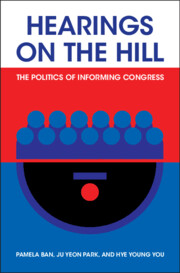
- Publisher:
- Cambridge University Press
- Online publication date:
- November 2024
- Print publication year:
- 2024
- Online ISBN:
- 9781009534048

Good public policy in a democracy relies on efficient and accurate information flows between individuals with firsthand, substantive expertise and elected legislators. While legislators are tasked with the job of making and passing policy, they are politicians and not substantive experts. To make well-informed policy, they must rely on the expertise of others. Hearings on the Hill argues that partisanship and close competition for control of government shape the information that legislators collect, providing opportunities for party leaders and interest groups to control information flows and influence policy. It reveals how legislators strategically use committees, a central institution of Congress, and their hearings for information acquisition and dissemination, ultimately impacting policy development in American democracy. Marshaling extensive new data on hearings and witnesses from 1960 to 2018, this book offers the first comprehensive analysis of how partisan incentives determine how and from whom members of Congress seek information.
‘Ban, Park, and You have produced a tour de force of the witnesses testifying in congressional hearings. It is the most comprehensive analysis that has been done on the information that Congress gets through congressional hearings and who provides it. The research question, the data analysis, and the results are all very important for those of us who are interested in not only Congress, but also how information is processed, how policies are developed, and how various groups are represented.’
Sean M. Theriault - University of Texas at Austin
‘Our lawmakers need to know things to make laws, but what do they know? Hearings on the Hill is easily the most important study to date about how Congress does (and doesn’t) inform itself when setting national policy. Drawing on unrivaled data, this seminal book reveals how the information that shapes our representatives’ policy decisions is just as susceptible to political influence as the votes they cast and campaigns they wage. This book will make a splash.’
James M. Curry - University of Utah
 Loading metrics...
Loading metrics...
* Views captured on Cambridge Core between #date#. This data will be updated every 24 hours.
Usage data cannot currently be displayed.